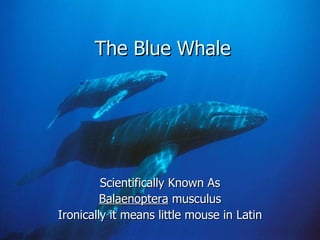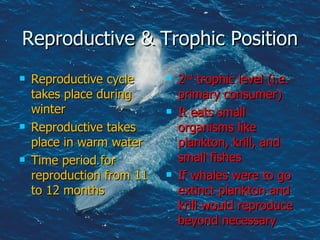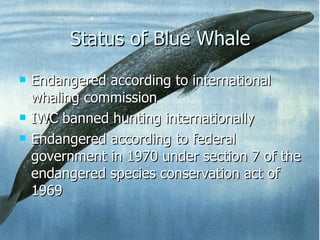Blue whale[2]
- 1. The Blue Whale Scientifically Known As Balaenoptera musculus Ironically it means little mouse in Latin
- 2. Unique Characteristics & Habitat Largest and loudest animal on earth Blue grey in color Lifespan from 35 to 80 years Can be found in all oceans with different ranges of temperature Ecosystem is the ocean
- 3. Blue Whale Food Web
- 4. Reproductive & Trophic Position Reproductive cycle takes place during winter Reproductive takes place in warm water Time period for reproduction from 11 to 12 months 2 nd trophic level (i.e. primary consumer) It eats small organisms like plankton, krill, and small fishes If whales were to go extinct plankton and krill would reproduce beyond necessary
- 5. Whale Size in Perspective
- 6. Status of Blue Whale Endangered according to international whaling commission IWC banned hunting internationally Endangered according to federal government in 1970 under section 7 of the endangered species conservation act of 1969
- 7. Animal Protection Act The International Whaling Comisssion Endangered SpeciesConservation Act of 1969 Being hunted excessively Began to be hunted for their oil and baleen Now there are only several thousand left
- 8. Protecting the Blue Whale Commercial whaling of the blue whale has been banned since 1967 We should lessen our dump of toxic waste Those who perform illegal wailing should be fiercely prosecuted Example: PCBs are one of many man-made chemicals used in the production of plastics and styrofoams- common components of beach trash. Mass die offs of cetaceans thought to be related to PCBs and other environmental factors have been increasing in the last decade.
- 10. Work Cited " Blue Whales." studyworld.com . studyworld.com, 2009. Web. 11 Mar 2010. <http://www.studyworld.com/basementpapers/sec_papers/Blue_Whales.html>. "Blue Whale (Balaenoptera musculus) ." National Parks Conservation Association . National Parks Conservation Association , n.d. Web. 11 Mar 2010. <http://www.npca.org/marine_and_coastal/marine_wildlife/bluewhale.html>. Karen, Worthington. "The Blue Whale (Balaenopters musculus)." North West Wild Life . North West Wild Life, n.d. Web. 11 Mar 2010. <http://www.northwestwildlife.com/articles/the_blue_whale.pdf>.









